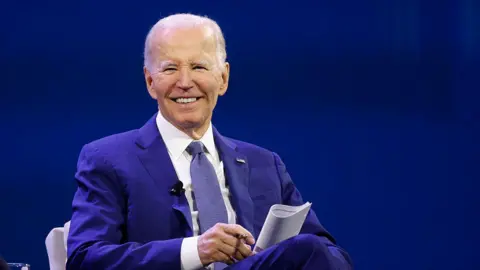A former Louisville Metro Police officer, Brett Hankison, has been sentenced to 33 months in prison after being convicted of violating Breonna Taylor’s civil rights during the botched raid that led to her tragic death. Taylor, a Black woman, became a symbol of the Black Lives Matter movement when she was shot dead in her home during a police operation in March 2020.
Hankison was found guilty by a federal jury last year for using excessive force when executing a "no-knock" search warrant at Taylor’s residence. Despite the potential for a life sentence, the federal judge imposed a 33-month prison term. The sentencing took place amid contrasting perspectives on the case; notably, the Trump administration had previously suggested a one-day sentence for Hankison, raising concerns among Taylor's family and advocates about inequality in the justice system.
Taylor's mother, Tamika Palmer, expressed dissatisfaction with federal prosecutors’ recommendation for a reduced sentence but remained hopeful for some measure of justice. Kenneth Walker, Taylor's boyfriend at the time of the raid, expressed gratitude for the accountability achieved through the conviction. Walker fired a shot during the police incursion, believing intruders were breaking into their home without properly identifying themselves.
The case highlights broader issues involving police accountability, as Hankison is the only officer charged directly in the botched operation. Another former officer, Kelly Goodlett, who admitted to falsifying evidence in the case, awaits sentencing. Outside the courthouse, demonstrators voiced their concerns, prompting arrests as police confronted protesting family members.
The Obama-era Attorney General Merrick Garland had emphasized that Hankison's actions resulted in a violation of Taylor's civil rights. However, with the shift in administration and leadership in the Justice Department, the sentencing recommendation presented a stark contrast to earlier prosecutorial stances. Critics, including Taylor's supporters, argue that the leniency shown in sentencing reflects ongoing inequalities in how justice is administered, particularly regarding race.
In the wake of this case, police reform discussions are at the forefront, especially with the current administration's focus on reversing previous reforms initiated under President Biden. The changes in leadership at the Department of Justice, with numerous resignations from key positions, including the Civil Rights Division, further complicate the landscape of policing reforms and oversight that many activists and lawmakers advocate.
The legacy of Breonna Taylor, her tragic death, and the subsequent legal proceedings continue to resonate throughout the United States, prompting ongoing calls for systemic change to ensure greater accountability and equity in law enforcement practices.





















